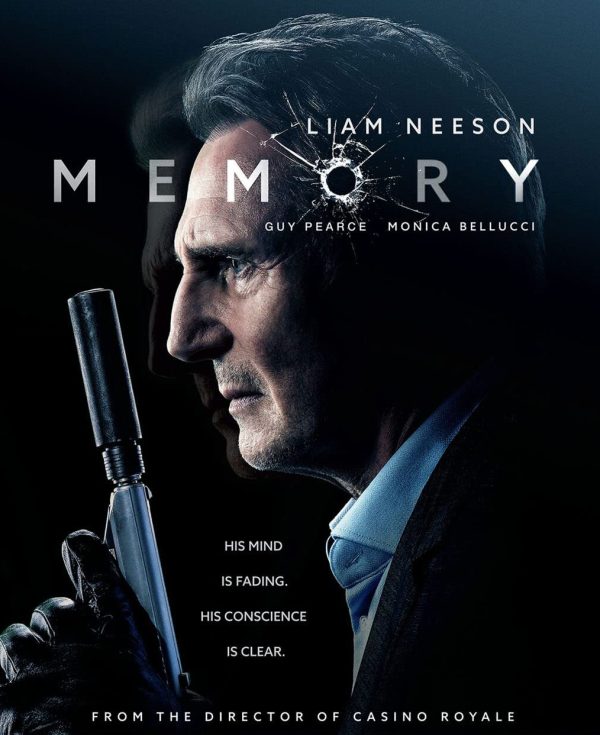Memory, 2022.
Directed by Martin Campbell.
Starring Liam Neeson, Guy Pearce, Taj Atwal, Harold Torres, Monica Bellucci. Ray Stevenson, Stella Stocker, Antonio Jaramillo, Ray Fearon, Lee Boardman, Rebecca Calder, Natalie Anderson, Atanas Srebrev, Scot Williams, Sigal Diamant, Doug Rao, Daniel De Bourg, Mia Sanchez, J.R. Esposito, and Kalina Stancheva.
SYNOPSIS:
An assassin-for-hire finds that he’s become a target after he refuses to complete a job for a dangerous criminal organization.
When it comes to his recent onslaught of disposable and interchangeable action fare, it’s been so long since Liam Neeson has worked with a notable director skilled in style and propulsive momentum that watching his performance here in Martin Campbell’s (Casino Royale, last year’s surprisingly fun The Protege, and many more) Memory (which is a remake of Belgium’s The Alzheimer’s Case, adapted from the novel of the same name by Jef Geeraerts), it almost feels like a resurgence inside a late-career genre that he had seemingly worn out his welcome. That doesn’t mean there’s anything new here or that the movie is good, but it’s a welcome jolt to see Liam Neeson busting heads while also delivering a performance that suggests he’s awake and cares.
Working as a contract killer, Alex Lewis, like practically every Liam Neeson character of the past 15 years, is thinking about getting out of the game and retiring. Of course, after watching Liam Neeson perform a similar routine countless times, we know there is no easy escape. However, a spin gives Memory a different feel from those other experiences, which is the protagonist suffering from the early stages of Alzheimer’s.
Still equipped with the usual hand-to-hand combat proficiency and firearm precision, Alex slowly unravels mentally over the story, often forgetting crucial details related to guns and evidence imperative to bringing the real villains to justice. There are quite a few instances depicting a physically and mentally vulnerable Liam Neeson, which wisely prevents Memory from fully functioning as a story where the geriatric hero saves the day. Refreshingly, the story is less about Liam Neeson’s protagonist and more about injustice and the legal system’s failings.
This is partially because Memory also boasts an impressive ensemble, following Guy Pearce as FBI agent Vincent Serra, Monica Belushi as despicable CEO Davana Sealman, a shady detective played by Ray Stevenson, and more criminal investigators played by Taj Atwal and Harold Torres, somewhat rounding things out. While Alex is taking care of his business, Vincent goes undercover, infiltrating the home of a father (Antonio Jaramillo) nonchalantly and grossly pimping out his teenage daughter Beatriz (Mia Sanchez) brainwashing the poor girl into believing that it’s a necessity for pursuing the American Dream. Things quickly go south, leaving the father dead and the daughter, who has no interest in testifying, detained and about to be deported, at least before Vincent steps in and gets her placed inside a group home.
For reasons that will become clear as Memory unspools, one of Alex’s upcoming targets happens to be the traumatized girl, with him naturally drawing a line with his superiors. It also turns out that some of his other contracts have also been related to a greater cover-up that essentially all comes back to people that have ties to Beatriz. Without spoiling too much, Alex also has a hazy recollection of certain events, designated a person of interest in this complicated spiderweb. Simultaneously, the legal system laughably fails at processing child abusers, which sets Alex on a tear killing his team and anyone else involved with the whole disturbing affair, essentially taunting them by leaving breadcrumbs, implying that they are too slow and incompetent at delivering justice. To the film’s credit, some of these fight sequences are pleasantly brutal, with sadistic mean-streak direction from Martin Campbell that ensures no happy ending will be.
As one can see, there is a lot of plot in Memory and several other characters there simply isn’t time to touch on. It’s all but clear that this narrative was born from a novel, as many intriguing characters feel underdeveloped, ranging from heroes deeply rooted in this case to villains. Occasionally, Memory is mildly confusing messiness, although Dario Scardapane’s script solidly peppers in lines of dialogue, succinctly summing things up.
Unfortunately, the Alzheimer’s aspect doesn’t come into play until the third act, so much of the film feels like the traditional Liam Neeson murder-fest but jacked up on intensity and viciousness. A better film would probably allow Liam Neeson to flex his dramatic side (primarily present in the last 30 minutes or so) more, but Martin Campbell is either sticking to the source material or more interested in letting Liam Neeson do his head-splitting thing. There is also something slightly offputting regarding the story’s central message, which is that murder is a necessity because even the vilest scum imaginable will walk away clean.
Memory is also a bit too scattershot and all over the place that it’s hard to completely invest in this otherwise dark and compelling tale. Ironically, it turns out that Liam Neeson is the best part of a film that does have more on its mind than giving the Irish brute his typical revenge motives. It shouldn’t be that way, though; as a whole, the story comes up short.
Flickering Myth Rating – Film: ★ ★ / Movie: ★ ★ ★
Robert Kojder is a member of the Chicago Film Critics Association and the Critics Choice Association. He is also the Flickering Myth Reviews Editor. Check here for new reviews, follow my Twitter or Letterboxd, or email me at MetalGearSolid719@gmail.com
















